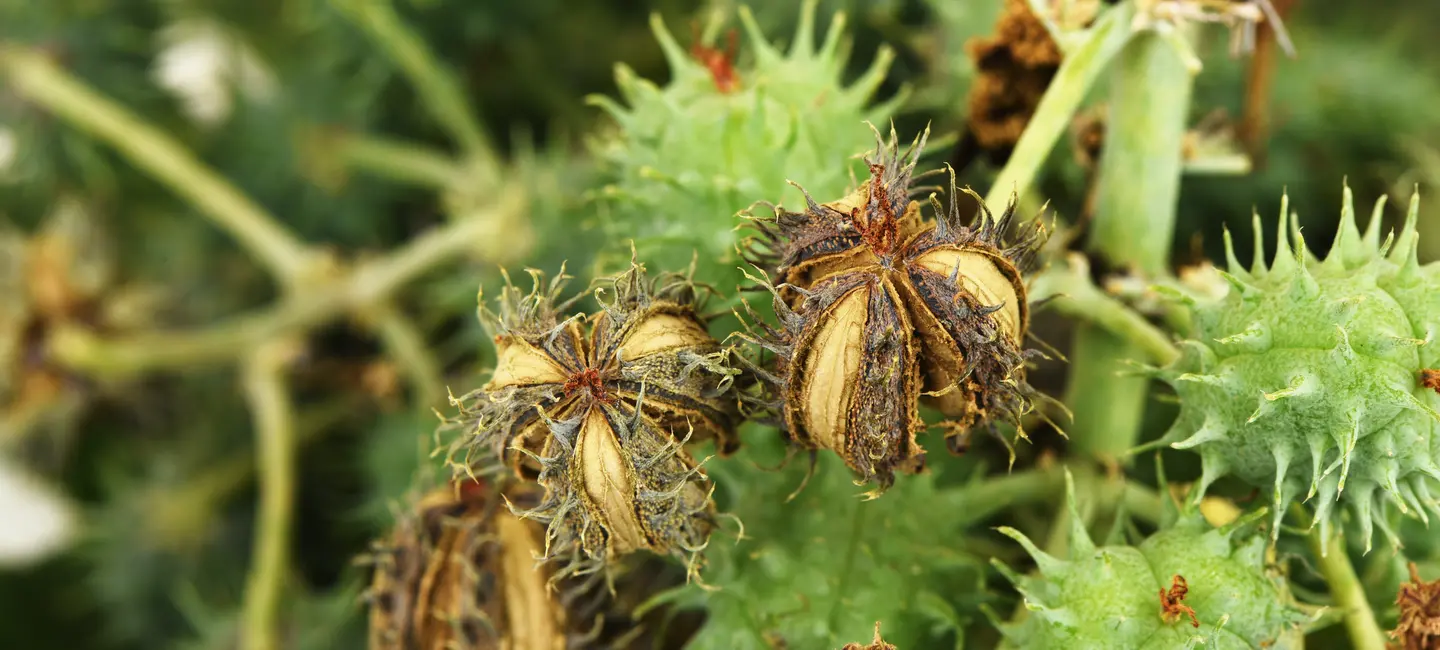
Castor oil is made from the beans (seeds) of the castor plant (Ricinus communis). Its taste is initially bland, then becomes bitter and unpleasant.
Castor oil has laxative and anti-inflammatory effects. It also might induce labor. It's sometimes flavored with cinnamon, peppermint, or other flavorings to mask its unpleasant taste.
People use castor oil for constipation, dry eye, childbirth, and to empty the colon before a colonoscopy. It is also used for osteoarthritis, rheumatoid arthritis, and many other conditions, but there is no good scientific evidence to support most of these uses.
The outer coat (hull) of the castor seed contains a deadly poison called ricin. The hull must be removed before use. Ricin has been tested as a chemical warfare agent. Weapons-grade ricin is purified and produced in particles that are so small they can be breathed in.
Is It Effective?
NatMed Pro rates effectiveness based on scientific evidence according to the following scale: Effective, Likely Effective, Possibly Effective, Possibly Ineffective, Likely Ineffective, Ineffective, and Insufficient Evidence to Rate.
- Emptying the colon before a colonoscopy. Taking castor oil by mouth might help empty the colon. But it's not clear if it works as well as other bowel preparations, such as sodium phosphate. Castor oil is not recommended for people who are preparing for a colonoscopy.
- Constipation. Taking castor oil by mouth seems to help relieve constipation.
- Dry eye. Using eye drops containing castor oil might reduce symptoms in people with dry eyes.
- Childbirth. Taking castor oil by mouth might start labor in patients who are at or past their delivery date but have not gone into labor.
There is interest in using castor bean for a number of other purposes, but there isn't enough reliable information to say whether it might be helpful.
Is it Safe?
When taken by mouth: Castor oil is likely safe when taken as a single dose of up to 60 mL. Side effects might include stomach discomfort, cramping, nausea, and dizziness. Castor oil is possibly unsafe when taken long-term or in large doses. It might cause fluid and potassium loss.
Castor seeds that have had the outer coat removed (hulled) are possibly safe when taken as a single dose. But consuming the whole castor seed is unsafe. The hull contains a deadly poison called ricin. Chewing as few as 1-6 whole seeds can kill an adult.
When applied into the eye: Castor oil eye drops are possibly safe when used for up to 30 days.
Special Precautions & Warnings:
Pregnancy: Castor oil is possibly safe when taken by mouth during pregnancy when at or beyond the pregnancy due date. But castor oil should not be used for this purpose without the supervision of a healthcare provider. Castor oil is likely unsafe when taken before the pregnancy due date is reached. It might bring on labor too early. Taking whole castor seeds by mouth is unsafe. There isn't enough reliable information to know if hulled castor seeds are safe or what the side effects might be. Stay on the safe side and avoid use.
Breast-feeding: There isn't enough reliable information to know if castor oil is safe to use when breast-feeding. Stay on the safe side and avoid use.
Children: Castor oil is possibly safe when taken by mouth in appropriate doses, short-term. But castor oil is possibly unsafe when taken by mouth for more than one week or at doses greater than 1-15 mL daily, depending on age. It can cause a chemical imbalance in the body. Taking whole castor seeds by mouth is unsafe.
Intestinal problems: Don't use castor oil if you have a blocked intestine, unexplained stomach pain, or problems with your bile ducts or gall bladder.
Water pills (Diuretic drugs)
Interaction Rating=Moderate Be cautious with this combination.
Castor oil is a laxative. Some laxatives can cause diarrhea and decrease potassium levels. "Water pills" can also decrease potassium levels. Taking castor oil along with "water pills" might make potassium levels drop too low.
There are no known interactions with herbs and supplements.
There are no known interactions with foods.
Castor oil has most often been used by adults as a single dose of 5-120 mL by mouth. Speak with a healthcare provider to find out what dose might be best for a specific condition.
African Coffee Tree, Arandi, Bi Ma Zi, Bofareira, Castorbean, Castor Bean, Castor Bean Plant, Castor Oil, Castor Oil Plant, Castor Seed, Erand, Eranda, Gandharva Hasta, Graine de Ricin, Huile de Ricin, Huile de Ricin Végétale, Mexico Weed, Palma Christi, Ricin, Ricin Commun, Ricin Sanguin, Ricine, Ricino, Ricinus communis, Ricinus sanguines, Tangantangan Oil Plant, Wonder Tree.
Information on this website is for informational use only and is not intended to replace professional medical advice, diagnosis, or treatment. While evidence-based, it is not guaranteed to be error-free and is not intended to meet any particular user’s needs or requirements or to cover all possible uses, safety concerns, interactions, outcomes, or adverse effects. Always check with your doctor or other medical professional before making healthcare decisions (including taking any medication) and do not delay or disregard seeking medical advice or treatment based on any information displayed on this website.
© TRC Healthcare 2024. All rights reserved. Use and/or distribution is permitted only pursuant to a valid license or other permission from TRC Healthcare.
